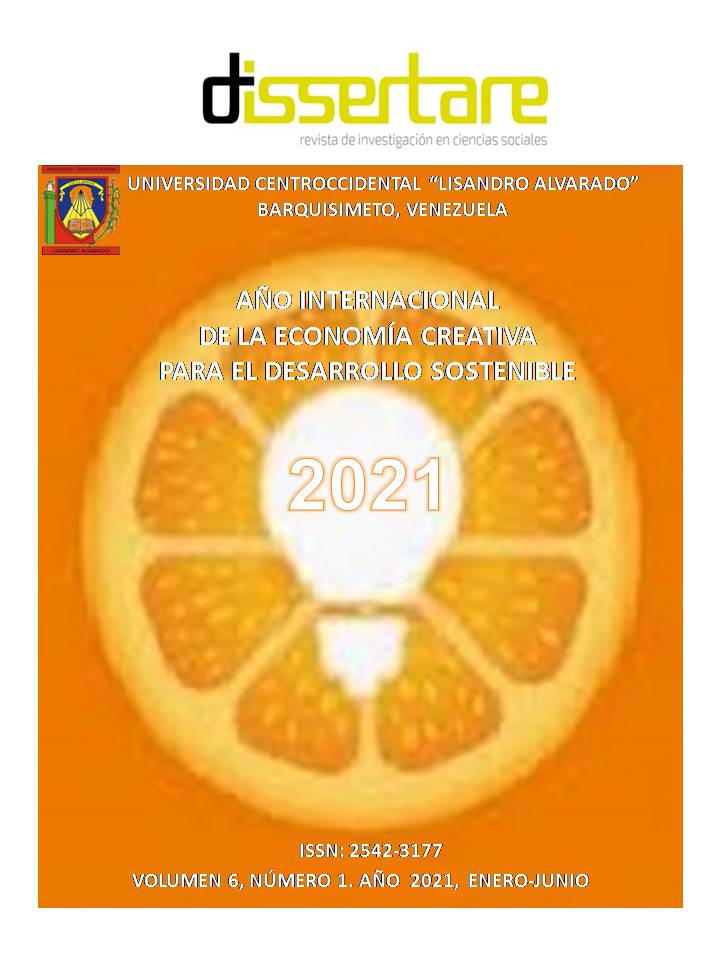Functions of human talent management: a praxiological view from venezuelan organizations
Keywords:
HR functions, human management, management of human talent in Venezuela, functions of human talent managementAbstract
This article aims to analyze the functions of the human talent management area in a set of Venezuelan organizations, from the perspective of their managers. In order to help characterize the reality of managerial praxis in this area of management, with emphasis on the role played by this area in the strategic approach of the organization. From a methodological point of view, the research has a quantitative approach, with a descriptive level and field design, and it covered a geographic space made up of eight states of the Bolivarian Republic of Venezuela, in which a sample of 38 managers was analyzed. It was possible to show the predominance of functions of an operational nature, largely leaving aside functions of a strategic nature. It is concluded that the human talent units are concentrated on traditional functions, so there are still challenges in recognizing the value that this unit can add in achieving the organization's strategies and objectives. It was recommended to give greater space to the HR area in decision-making processes and in strategic management, as well as greater participation in efforts to build well-being in favor of employees, creating links of identification and loyalty towards the organization.
Keywords: HR functions; human management; management of human talent in Venezuela, functions of human talent management.
Downloads
References
Aguilar, J. C. (2014). Retos y rol estratégico en la gestión del talento humano Caso en empresas de Cali, Colombia. Revista Mercados y Negocios, 15(1), 4-20. https://webcache.googleusercontent.com/searchq=cache:XQ8s1L68KzsJ:https://dialnet.unirioja.es/servlet/articulo%3Fcodigo%3D5811263+&cd=2&hl=es&ct=clnk&gl=ve
Armijos, F., Bermúdez, A. y Mora, N. (2019). Gestión de administración de los recursos humanos. Universidad y Sociedad, 11(4), 163-170. https://rus.ucf.edu.cu/index.php/rus/article/view/1295/1317
Botero, N. (2007). Gestión del conocimiento para la administración del recurso humano “estado del arte”. Anagramas, 6(11), 61–74. https://webcache.googleusercontent.com/search?q=cache:wTqouOS4qX4J:https://dialnet.unirioja.es/descarga/articulo/4851651.pdf+&cd=1&hl=es&ct=clnk&g
Chiavenato, I. (2009). Gestión del Talento Humano. McGraw Hill.
Dessler, G. y Valera, R. (2011). Administración de recursos humanos. Enfoque latinoamericano. Prentice-Hall https://cucjonline.com/biblioteca/files/original/0ee49930c54202fa9d631ebce4af2438.pdf
Fitz-enz, J. (1999). Cómo medir la gestión de los recursos humanos. Deusto.
García, J., Durán, S., Parra, M., Márceles, V. (2017). Dirección estratégica del talento humano para el fomento de valores en los cuerpos policiales venezolanos. Revista Espacios, 38(32), 16-27. https://www.revistaespacios.com/a17v38n32/a17v38n32p16.pdf
Hernández, R. (2011). Instrumentos de recolección de datos en ciencias sociales y ciencias biomédicas: validez y confiabilidad. Diseño y construcción. Normas y formatos. Universidad de Los Andes.
Majad Rondón, M. A. (2016). Gestión del talento humano en organizaciones educativas. Revista de Investigación, 40(88), 148-165. http://ve.scielo.org/pdf/ri/v40n88/art08.pdf
Montoya, C. y Boyero, M. (2016). El recurso humano como elemento fundamental para la gestión de calidad y la competitividad organizacional. Revista Científica Visión de Futuro, 20(2), 1-20. https://www.redalyc.org/pdf/3579/357947335001.pdf
Prieto, P. (2013). Gestión del talento humano como estrategia para retención del personal (Tesis de postgrado). Universidad de Medellín. https://repository.udem.edu.co/bitstream/handle/11407/160/Gesti%C3%B3n%20del%20talento%20humano%20como%20estrategia%20para%20retenci%C3%B3n%20del%20personal.pdf?sequence=1
Prieto, R., Villasmil , M. y Urdaneta, L. (2011). Gestión humana en organizaciones postmodernas. Base fundamental hacia la excelencia organizacional. CICAG, 8(2), 1-13.
Ramírez, R., Espindola, C., Ruíz, G. y Hugueth, A. (2019). Gestión del talento humano: análisis desde el enfoque estratégico. Información Tecnológica, 30(6), 167-176. http://dx.doi.org/10.4067/S0718-07642019000600167
Rendueles, M. y Dreher, M. (2008). Evolución histórica de la función de recursos humanos en Venezuela. TELOS. Revista de Estudios Interdisciplinarios en Ciencias Sociales, 10(1), 93–106. https://www.redalyc.org/pdf/993/99318315007.pdf
Rodríguez, E. (2005). Metodología de la investigación. Universidad Juárez Autónoma de Tabasco.
Salazar, C. M., Cancino, B, y Delgado, C.A. (2003). Análisis del rol del área de recursos humanos en micros, pequeñas, medianas y grandes empresas de Chillán. Theoria, 12(1), 87-95. https://www.redalyc.org/pdf/299/29901208.pdf
Sani, G. y Zamora, B. (2017). Diseño de manual de procedimientos de mejora para la gestión de talento humano en la empresa Mastersoft S.A (Tesis de pregrado).Universidad de Guayaquil. http://repositorio.ug.edu.ec/bitstream/redug/28536/1/TESIS-MANUAL%20DE%20PROCEDIMIENTO%20PARA%20MEJORA%20DE%20LA%20GESTION%20DE%20TALENTO%20HUMANO%20-%20GABRIELA%20SANI-%20BETSABETH%20ZAMORA.pdf
Santacruz, F. (2011). Análisis de las prácticas de gestión humana en la efectividad para retener el talento humano dentro de la organización (Tesis de postgrado). Universidad Nacional de Colombia. https://repositorio.unal.edu.co/handle/unal/7425
Sarduy, Y. (2007). El análisis de información y las investigaciones cuantitativa y cualitativa. Revista Cubana de Salud Pública, 33(3), 1-11. https://www.redalyc.org/pdf/214/21433320.pdf
Storey, J., Wright, P. y Ulrich, D. (2019). Strategic human resource management. A research overview. Routledge.
Ulrich, D. (1997). Human resource champions. Harvard Business School Press.
Ulrich, D. (2010). Are we there yet? What’s next for RH. Michigan Ross School of Business. https://michiganross.umich.edu/sites/default/files/uploads/RTIA/pdfs/dulrich_wp_arewethereyet.pdf
Werther, W. y Davis, K. (2008). Administración de recursos humanos. El capital humano de las empresas. McGraw-Hill Interamericana.
Published
How to Cite
Issue
Section
Copyright (c) 2021 Michael Josué Aular galindo

This work is licensed under a Creative Commons Attribution-NonCommercial-ShareAlike 4.0 International License.
Derechos del/de autor/es a partir del año de publicación
Esta obra está bajo la licencia:
Creative Commons Reconocimiento-NoComercial-CompartirIgual 4.0 Internacional (CC BY-NC-SA 4.0)
Las opiniones expresadas por los autores no necesariamente reflejan la postura del editor de la publicación ni de la UCLA. Se autoriza la reproducción total o parcial de los textos aquí publicados, siempre y cuando se cite la fuente completa y la dirección electrónica de esta revista. Los autores(as) tienen el derecho de utilizar sus artículos para cualquier propósito siempre y cuando se realice sin fines de lucro. Los autores(as) pueden publicar en internet o cualquier otro medio la versión final aprobada de su trabajo, luego que esta ha sido publicada en esta revista.





